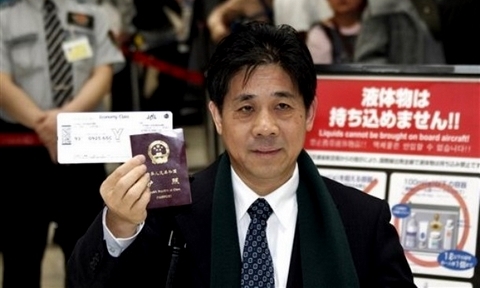After he was denied re-entry to China eight times, Feng Zhenghu lived in Tokyo’s Narita Airport for 92 days in 2009-2010. Now Feng is telling the story of his airport odyssey on his blog, and CDT is translating his account.
This is part 38. Read previous installments here.
December 10th, 2009
Today is December 10th, and it’s my 37th day camped outside the gate to Japan.
At 10 a.m., an American human rights organization lawyer called me, and I chatted with her for an hour and a half. It was a relaxed discussion of my views regarding some of China’s problems.
As soon as the lawyer hung up, I got a call from a Radio Free Asia reporter. She told me, “Citizens of Shanghai are starting to go on a hunger strike to support you, what is your opinion of this?” I told her, “I’m grateful for the support of the citizens of Shanghai. The citizens of Shanghai are free to choose whatever method of petition they’d like, but I caution against using a method that could cause damage to their bodies. I’ve never been an advocate of hunger strikes. There are many forms of protest.” After the phone call, I looked online and confirmed this was happening, and moreover, that the head petitioners were Shanghai citizens with whom I was acquainted. I was very moved, and grateful that these friends bravely took a stand to petition the Chinese government for me, for themselves, and for all Chinese people. More and more people in more and more places will join the ranks of the petitioners, because the Chinese people cannot be deprived of their freedom to return home.
I’d like to take this opportunity to express my admiration of these Shanghai city residents: Tong Guojing, Mao Hengfeng, Zheng Enchong, Shen Peilan, Jin Yuehua, Liu Yiliang, Pan Weixian, Huang Yuqing, Chen Qiyong, Li Huifang, Xu Jieqin, and Wang Shuizhen.
At 12:30 p.m., today’s on-duty chief examiner came back to give me the eighth official document, the content of which was the same as yesterday, with only the date changed, and he took a photo with me. I also sent the “December 10 Japanese Official Document, Forwarded to the Chinese Government by Feng Zhenghu (No. 8)” to online media outlets for publication, and attached a photo of the Japanese official document.
After I received the document, I left the immigration hall and went to a place where I could get some sun. According to my doctor friend, the glass window blocks the ultraviolet rays in the sunlight I receive, and therefore it doesn’t offer any health benefits. However, something is better than nothing, and I feel the warmth of the sun is still beneficial. At 1:20 p.m., a reporter from the Wall Street Journal called for a phone interview, with an American who spoke Chinese serving as an interpreter. The interview lasted until 2:31 p.m. By the time the interview was over, I’d had enough sun, so I returned to my temporary residence.
Today the reporters who called all brought up this question: “Today is Human Rights Day, do you have any big plans?”
My response: “I do human rights work every day, but I’m taking today off.”
At first they were surprised when they heard this, but after hearing my explanation they laughed.
I said, “Today is the day that the United Nations issued the Universal Declaration of Human Rights. The Universal Declaration of Human Rights was issued by the United Nations with the approval of United Nations Member States. Theoretically, the United Nations and its Permanent Members, in particular, Western governments, should respect and implement the universal values and stipulations contained in the Universal Declaration of Human Rights. Thus, today is essentially a day when the United Nations and major Western governments should pay special attention to human rights issues. It is not, however, a day when common people who lack rights and power should suffer persecution for demanding the implementation of the Universal Declaration of Human Rights.
Do the United Nations and major Western governments still care about the Universal Declaration of Human Rights? I’m not going to discuss China’s domestic human rights issues. They are, perhaps, too complicated. Instead, I’ll talk about my simple problem. The second line of Article 13 of the Universal Declaration of Human Rights stipulates, “Everyone has the right to leave any country, including his own, and to return to his country.” Due to difficulties returning to China, I’ve been camped on Japan’s doorstep for 37 days. News media around the entire world is constantly reporting on it, and people know about it. It’s only the government that’s pretending not to see it. It seems like in this universe there is no “Universal Declaration of Human Rights.” Those who drafted and issued it don’t even take it seriously. They may have even forgotten about it, so why should the common people perceive the anniversary of its publication to be an important occasion, and why must they do something big on this day? And so, I’m taking today off.
I thought of something else—if the Chinese people also took today off, maybe today would be the best day on China’s human rights record. At least far fewer people would suffer persecution while commemorating Human Rights Day. We fight every day for our rights, we’re just taking today off, and returning the responsibility back to the United Nations, major Western governments, and the Chinese government. If the Chinese people forget that today is Human Rights Day, the United Nations and the major Western governments will remember that there is a Universal Declaration of Human Rights, and they will assume the responsibility that should be theirs, and make the Chinese people believe in the universality of human rights. When international society starts to truly respect the Universal Declaration of Human Rights, the Chinese government will also respect it. [Chinese]
Translation by Heidi.








